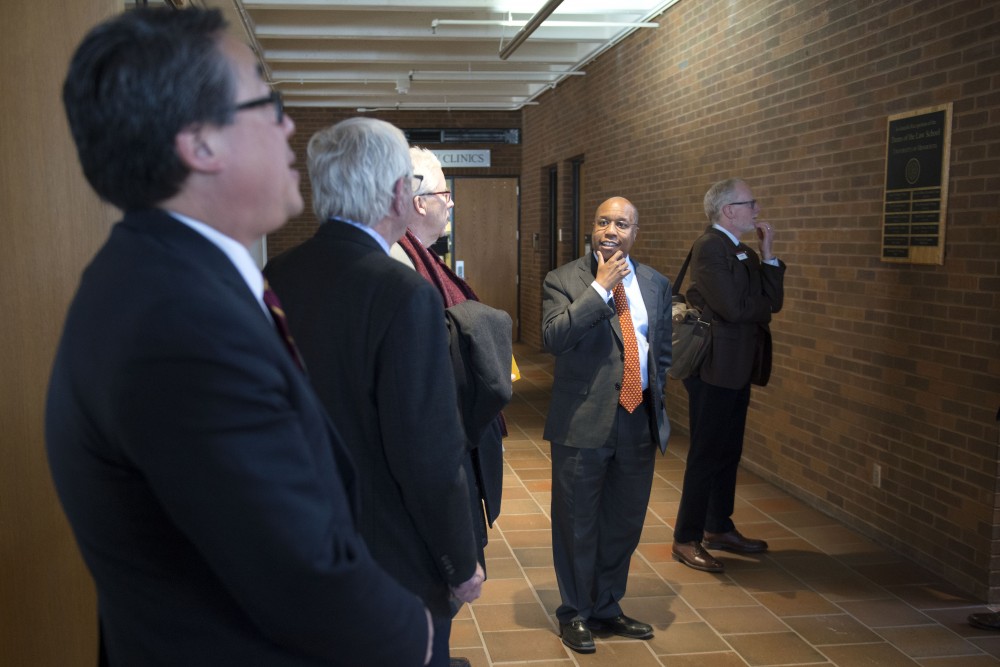Members of the Board of Regents spent their Thursday meeting with academic leaders, faculty and students on the University of Minnesota’s West Bank as part of the board’s annual campus tour.
This year’s visit focused on the University’s professional programs, touching on a wide range of issues, including schools’ instruction practices, student issues — like mental health services and student debt — and the University’s work in the broader community. In recent years, the regents have toured the Rochester and Duluth campuses.
Regents met with dozens of faculty and students from the Carlson School of Management, the Law School and the Humphrey School of Public Affairs throughout the day, providing a first-hand look at the University’s on-the-ground operations. The visit was part of the board’s ongoing look at graduate and professional programs.
“This isn’t the biggest area and the most visible area, but this is an area where the schools we have here are very impactful,” said Board of Regents Chair David McMillan. “It’s really important to get out of the sixth floor of McNamara and see this side of the river.”
Practicality at Carlson’s forefront
At the Carlson School, officials and students touted the school’s master’s programs and the academic curriculum’s applicability in the workforce.
Jennifer Langstraat, a recent Carlson graduate, said she liked the master’s program’s focus on real-world learning. “It really enables you to bring it back to your work,” she said. “From every class that I took, all those different electives, I was able to bring back something to my office right away.”
Carlson School Dean Sri Zaheer emphasized the need for both strong undergraduate and professional programs, which she said benefit one another. “Our MBAs are often quite surprised by how smart our undergraduates are,” she said. “There’s a lot of learning that’s going on both ways.”

Law students demand diversity
Later in the day, Law School students raised concerns to the regents about diversity, student debt and undergraduate outreach.
Third-year law student David Gomez said the Law School needs to do more work to increase diversity — an issue also highlighted by Law School Dean Garry Jenkins, who pointed out the University’s law students are less diverse than some neighboring Big Ten schools.
“I would like a school that looks like Minnesota or just even the Twin Cities region,” Gomez said, highlighting that he was the only Latino male in his class.
Veena Tripathi, a third-year law student, mentioned the large debt many law students are saddled with after graduating, which is often more than $100,000. “It’s just like a constant shadow over things,” she said. “It’s a very real thing and it’s not comfortable.”
Third-year law student Henry Rymer said he would like to see more outreach to recruit and retain undergraduate students. “I would love to see the pre-law program become more robust or at least more open,” he said.
Humphrey School addresses political climate, mental health resources
When meeting with members of the Humphrey School in the late afternoon, regents questioned how the University is dealing with today’s partisan political climate.
“I don’t think the average person knows what the common good is anymore,” said Regent Richard Beeson. “We need you to be the adults in the room and to be able to explain what is happening, what our common ground is and create a civil discourse … because it’s not getting done anywhere else.”
Regent Dean Johnson echoed that idea, saying the Humphrey School needs to look at “how to begin to close the gap of partisan politics.”
Humphrey School Dean Laura Bloomberg said the school is well-poised to take on those challenges, especially by producing graduates who know how to debate respectfully, compromise and promote democratic practices.
“Our overarching framework is [what] we say regardless of what the curriculum is: advancing hope, opportunity and equity in a changing world,” she said.
Throughout the tour of West Bank, concerns about mental health came to regents’ attention — an issue Regent Randy Simonson brought up later in the day.
“In the three different areas we’ve been at today, mental health is an issue,” he said.
Though West Bank does not have a mental health office, Humphrey School leaders said there’s a new collaborative focused on mental health issues and students are pushing for permanent space for mental health services on the campus.
Regent Thomas Anderson said he was “absolutely flabbergasted” there was no place for mental health services on the West Bank.
“You’ve got to have mental health available when you need it. You can’t say, ‘Call over to the East Bank and they’ll give you an appointment in two weeks,’” he said.
For Anderson and other regents, it was one of many issues brought to light during the full day on the West Bank.
“It’s a great opportunity for us to learn about the University,” he said.

















